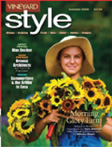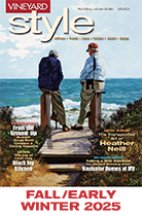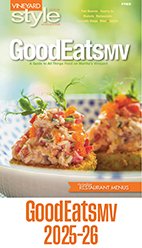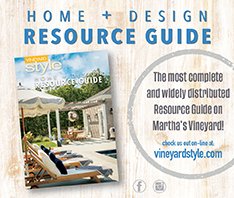ON ISLAND

Rising Tides
Helping Others Grow Through Horsemanship
by Amelia Smith
At Rising Tide Therapeutic Equestrian Center, horsemanship is a way for people to grow, to overcome physical and mental challenges, to develop skills, and to enjoy themselves. Students range in age from preschoolers to the elderly, and come with a broad range of abilities and challenges. “We want to make it accessible to everyone,” says Vickie Thurber, the program’s founder, but the priority is reaching children and adults with disabilities.
After Vickie retired from the Post Office in 2006, she was boarding her horse and teaching a few lessons at Susan Fieldmith’s barn. Susan, a Licensed Mental Health Counselor, asked Vickie to teach a couple of kids she was working with, as a way to help them develop confidence. “I’d been around horses my whole life,” says Susan, “and I knew that this could be a very healing connection, because it was to me as a child.”
Susan introduced Vickie to the concept of therapeutic riding, and Vickie took it from there. “It opened me up to the other things that connections with horses can provide for people,” Vickie says. In 2007, she established Rising Tide as a non-profit, primarily funded through a combination of grants, donations, and fundraisers, as well as fees from lessons.
Dozens of volunteers help to keep the fledgeling organization afloat and growing. “We have about 30 volunteers for any one session,” Vickie says. Most of those volunteers don’t have a background in horsemanship, but come because they want to help people. The horses share that calling. “Just like people, some horses have the temperament for teaching special needs, or being therapeutic,” Susan says. “We find that overall, big horses, strong, stocky horses are best for students who may be physically unbalanced.” The program is currently searching for another therapeutic riding horse, and it can be hard to find the right fit.
“Our mindset is slow and easy, let’s think about safety first,” says Chrissy Arenburg, instructor and barn manager. “A lot of our riders are slow to react, so we have to let them process, let them understand it.” Chrissy says that working with these riders has informed her other work with horses, as well. “It’s just a great thing to do, and I love doing it,” she says, and extolls the benefits that riding can bring to different students.
For someone confined to a wheelchair, sitting on a horse mimics the hip movements of walking, and gives freedom of movement. One of Chrissy’s students has learning disabilities, and spent the entire summer mastering the routine of taking care of a horse. That process increased her confidence in other areas of her life. “Her mom says that she believes she can do something now,” says Chrissy. “It’s helped her out at school and at home.” Other students are stimulated less directly, but just as effectively. “For kids that are non-verbal, sometimes getting them up on a horse and moving stimulates the brain and they’ll just start talking,” Chrissy says.
“The smiles and the positive mood from riding will carry them through the rest of the day,” says Vickie. “It’s something that we want to expand on, looking into the bigger picture of how to help these people.” For children with disabilities on the island, there are a lot of resources, but there’s not so much to do once they turn 18. “The dream is to have our own place, with an indoor ring,” Vickie says. They’re on the lookout for a property which could serve as an inclusive center, for people of all ages, with and without disabilities.
Meanwhile, the work is its own reward. “I get instant gratification when they’re working on the horses,” Vickie says, “I get to see it when it happens.”
After Vickie retired from the Post Office in 2006, she was boarding her horse and teaching a few lessons at Susan Fieldmith’s barn. Susan, a Licensed Mental Health Counselor, asked Vickie to teach a couple of kids she was working with, as a way to help them develop confidence. “I’d been around horses my whole life,” says Susan, “and I knew that this could be a very healing connection, because it was to me as a child.”
Susan introduced Vickie to the concept of therapeutic riding, and Vickie took it from there. “It opened me up to the other things that connections with horses can provide for people,” Vickie says. In 2007, she established Rising Tide as a non-profit, primarily funded through a combination of grants, donations, and fundraisers, as well as fees from lessons.
Dozens of volunteers help to keep the fledgeling organization afloat and growing. “We have about 30 volunteers for any one session,” Vickie says. Most of those volunteers don’t have a background in horsemanship, but come because they want to help people. The horses share that calling. “Just like people, some horses have the temperament for teaching special needs, or being therapeutic,” Susan says. “We find that overall, big horses, strong, stocky horses are best for students who may be physically unbalanced.” The program is currently searching for another therapeutic riding horse, and it can be hard to find the right fit.
“Our mindset is slow and easy, let’s think about safety first,” says Chrissy Arenburg, instructor and barn manager. “A lot of our riders are slow to react, so we have to let them process, let them understand it.” Chrissy says that working with these riders has informed her other work with horses, as well. “It’s just a great thing to do, and I love doing it,” she says, and extolls the benefits that riding can bring to different students.
For someone confined to a wheelchair, sitting on a horse mimics the hip movements of walking, and gives freedom of movement. One of Chrissy’s students has learning disabilities, and spent the entire summer mastering the routine of taking care of a horse. That process increased her confidence in other areas of her life. “Her mom says that she believes she can do something now,” says Chrissy. “It’s helped her out at school and at home.” Other students are stimulated less directly, but just as effectively. “For kids that are non-verbal, sometimes getting them up on a horse and moving stimulates the brain and they’ll just start talking,” Chrissy says.
“The smiles and the positive mood from riding will carry them through the rest of the day,” says Vickie. “It’s something that we want to expand on, looking into the bigger picture of how to help these people.” For children with disabilities on the island, there are a lot of resources, but there’s not so much to do once they turn 18. “The dream is to have our own place, with an indoor ring,” Vickie says. They’re on the lookout for a property which could serve as an inclusive center, for people of all ages, with and without disabilities.
Meanwhile, the work is its own reward. “I get instant gratification when they’re working on the horses,” Vickie says, “I get to see it when it happens.”








